MercoPress. South Atlantic News Agency
Tag: Central Bank of Argentina
-
Saturday, June 8th 2019 - 09:53 UTC
Brazil central bank denies plans for a monetary union with Argentina
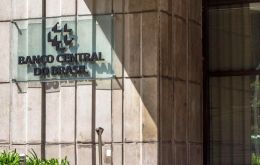
Brazil’s central bank has denied any planning is underway to create a monetary union with Argentina, after a spokesman for the government in Buenos Aires said on Thursday it was the case.
-
Thursday, October 4th 2018 - 08:24 UTC
Argentine Peso strengthens for third day running supported by high interest rate for short term debt
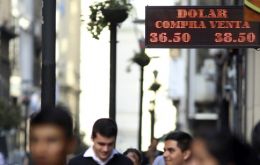
Argentina’s peso rallied for a third straight day on Wednesday, after high-interest short-term debt issued by the central bank soaked up liquidity, a strategy that has raised concern about the sustainability of the country’s program.
-
Tuesday, October 2nd 2018 - 08:21 UTC
Argentine Peso rises 4% after central bank sells seven-day notes paying 72%
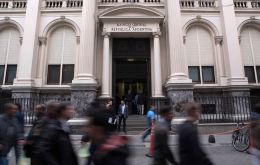
The he Argentine peso climbed more than 4% on Monday trading on the back of a debt sale by the central bank aimed at mopping up excess liquidity and signs that the International Monetary Fund (IMF) is solidly behind the administration of president Mauricio Macri.
-
Thursday, September 27th 2018 - 09:19 UTC
Argentine Peso with trading band and zero growth monetary supply policy
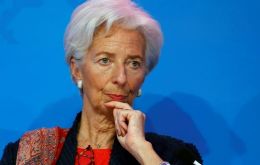
The International Monetary Fund Managing Director Christine Lagarde, speaking at a news conference in New York alongside Argentine Economy Minister Nicolas Dujovne, said IMF was “significantly frontloading” disbursements under the program adding the Argentine central bank had agreed as part of the deal to allow the peso currency to float freely and would only intervene in the foreign exchange market in extreme circumstances.
-
Tuesday, September 11th 2018 - 09:12 UTC
Argentine equities and Peso lose ground on Monday: IMF and budget concerns
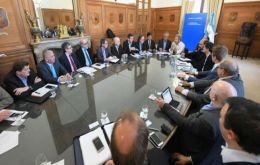
Argentine equities and the peso both lost ground on Monday as analysts said intervention in the foreign exchange market by the nation's central bank may prove less successful than originally hoped.
-
Friday, August 24th 2018 - 08:50 UTC
Argentina’s economy contracts in June for the third month running
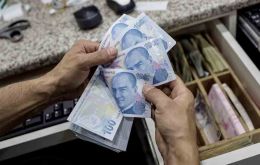
Argentina’s economy contracted 6.7% in June compared with the same month last year, and 1.3% compared with May, government statistics agency Indec said on Thursday. June was the third consecutive month of decline following 5.2% in May and 0.6% in April.
-
Thursday, June 14th 2018 - 22:14 UTC
IMF's Lagarde welcomes Argentina government’s economic policy plans
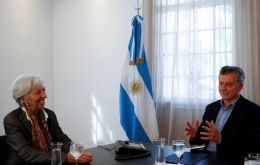
Argentine authorities have asked to use US$7.5 billion of the US$50 billion financing deal signed with the International Monetary Fund to fund their budget, IMF Managing Director Christine Lagarde said in a statement. Argentina’s Finance Ministry said in a separate statement that the funds would be sold on the market through pre-announced daily auctions conducted by the central bank.
-
Saturday, May 5th 2018 - 07:24 UTC
Argentina hikes benchmark rate to 40%, easing pressure on the Peso but not on inflation
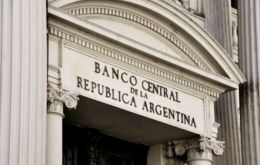
Argentina's Central Bank on Friday hiked its benchmark interest rate to 40% to support the peso, the third such hike in just over a week and one day after the currency plunged in value. Following the decision, the peso -- which has lost more than 10% of its value in the past month -- opened 6% higher against the dollar.
-
Thursday, April 12th 2018 - 08:59 UTC
Argentina central bank keeps benchmark interest rate at 27.75%
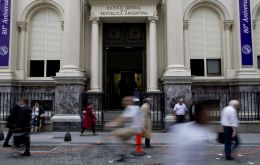
Argentina’s central bank held its benchmark interest rate at 27.25% this week, the monetary authority said in a statement, noting that high-frequency indicators suggested core inflation would remain high in April, but below March’s levels.
-
Wednesday, January 10th 2018 - 09:52 UTC
Argentine central bank cuts basic rate to 28%; annual inflation target 15%
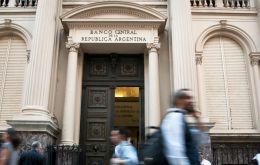
Argentina’s central bank cut its policy rate to 28% from 28.75%, two weeks after relaxing its 2018 inflation target, the bank said on Tuesday. The bank’s first rate cut in 14 months came after a December 28 news conference announcing an official inflation target for this year of 15%, up from the bank’s previous target range of 8% to 12%.
